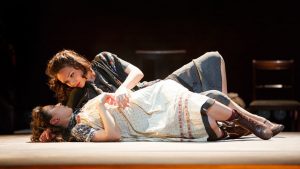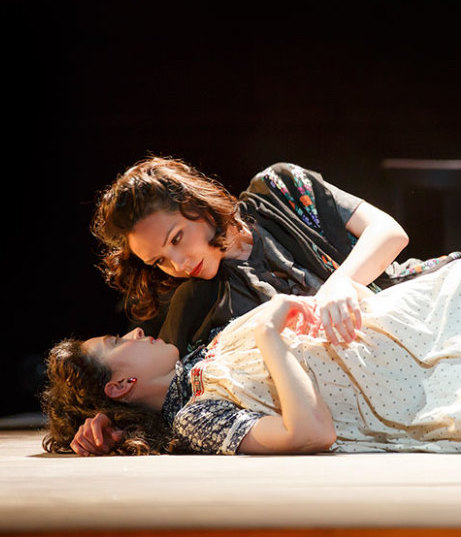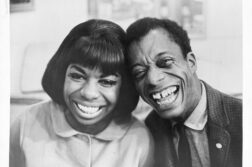 Indecent
Indecent
A Play by Paula Vogel
Directed by Rebecca Taichman
At the Cort Theatre, NYC
April 4–Aug. 6, 2017
PAULA VOGEL, the Pulitzer-prize winning dramatist of How I Learned to Drive, has again collaborated with director Rebecca Taichman in Indecent. Taichman, who just won the 2017 Tony for best direction of a play, is billed as “co-creator” of Indecent, having worked with Vogel to devise the play’s highly theatrical presentation. The play is at once a compressed history of a daring Yiddish play, God of Vengeance, written by the Polish novelist Sholem Asch in 1907, and a celebration of the stagecraft that makes theater distinct from film.
Using a cast of seven, each playing multiple roles, and three musicians who weave among the actors, the scenes move episodically through the development and touring success of Asch’s drama about an observant Jew who runs a brothel in his basement, and his virgin daughter who falls in love with one of the house prostitutes—shades of Shylock and his daughter Jessica. This, at least, is about as much of the Asch play as Indecent reveals.
Scandalous in its time, God of Vengeance was nevertheless celebrated in St. Petersburg and Moscow and in other European capitals. On first hearing the play, the founding father of Yiddish literature I. L Peretz advised Asch to “burn it.” Peretz and other naysayers were reacting as much to the implicit critique of Jewish life as to the idealistic yet carnal presentation of two young women in thrall to each other. Asch’s depiction of flawed, complex Jews and his willingness to approach lesbianism in his play may well have been the very ingredients that allowed sophisticated theater-goers before the Great War to find God of Vengeance worthy dramatic fare.
Indecent is threaded with period klezmer, folkloric and cabaret dance, and theatrical flourishes. There are back-wall projections that translate a few Yiddish conversations, or designate the city and date in which a scene is set, or signal a momentary lapse in time as a

single note is struck on a triangle. In consequence, characters “freeze” their action, then take up the scene a beat later. The Vengeance players are, in fact, Wandering Jews, and Indecent links their migrations to those of immigrants in search of safer shores. Vogel-Taichman’s work is swiftly paced, condensing Asch’s biography and his play’s trajectory into a fleet hour and 45 minutes. In Vogel’s telling, Asch becomes the representative of those enlightened Ashkenazi Jews for whom Yiddish was their lingua franca, a linguistic vehicle toward modernity, even in some cases a means to position themselves as secular writers trading in subjects of cosmopolitan currency beyond the impoverished shtetls of Eastern Europe.
Sitting out World War I in New York, Asch visited Europe after the Great War and was deeply shaken by the depredations visited upon Jewish communities. Back in New York, his devoted wife was alarmed at his increasing depression and his quick temper. An English-language production in Greenwich Village in 1922 was another success, but the play’s move uptown to Broadway encouraged the producer to cut the crucial “rain scene” with its joyous lesbian kissing and embraces, and to shift the lesbian relation to one of female manipulation. The troupe protested this desecration of the text, but Asch yielded to the producer’s reading of the uptown audience. Even with the cuts, however, the entire cast and the producer were indicted for obscenity and found guilty at trial, although the verdict was overturned on appeal.
Living in America, Asch seemingly abandoned his play, refusing future performances of God of Vengeance in the wake of Nazi restrictions on Jewish life. However, Vogel shows a group of desperate Jews, confined to the Lodz ghetto, performing the Asch play under the leadership of the original stage manager, a character here called Lemml. Vogel uses Lemml as a distant echo of Thornton Wilder’s Stage Manager in Our Town, a “narrator” who breaks the fourth wall and introduces us to the world of the present drama and the past history of Asch’s play.
The world in which Asch came of age has almost disappeared by the time we see him in the early 1950s. This is toward the end of Vogel’s play; he is being interviewed by a young Jewish student from Yale. This prompts an embittered Asch to quip—I paraphrase—that it is easier for a rich man to enter the kingdom of heaven than for a Jew to enter the sanctum of Yale. In following the travels and travails of the playwright and players of the God of Vengeance, Vogel tracks the stamina of art and the vulnerability of life, but also helps to revive Asch’s reputation and retrieve the memory of a lost culture.
Allen Ellenzweig is writing a biography of celebrity portrait and male nude photographer George Platt Lynes (1907-1955).






